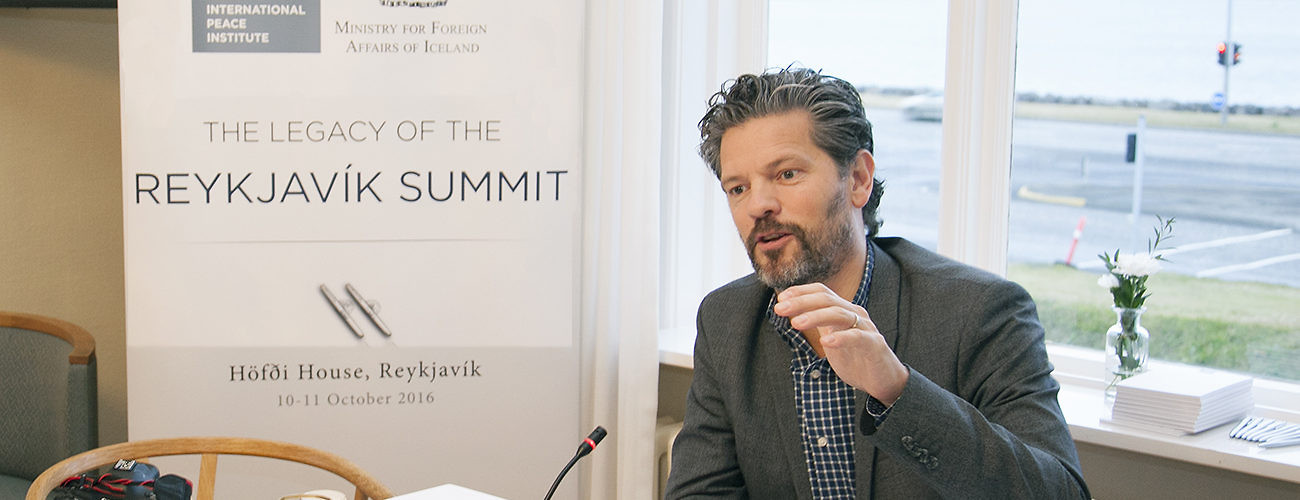On October 11-12th, IPI held an event in Reykjavik to discuss the legacy of the historic meeting between the President of the United States Ronald Reagan and the General Secretary of the Communist Party of the Soviet Union Mikhail Gorbachev of exactly thirty years earlier, and to see if and how the “spirit of Reykjavik” could inspire leaders of today to return to negotiations on arms control, reduce tensions between Russia and the West, and reignite the hope of nuclear weapons-free world.
The meeting took place in Höfdi House in the Icelandic capital where Mr. Gorbachev and Mr. Reagan had met for two days of intense negotiations in October 1986. American and Russian negotiators, who witnessed the event, stressed how “Reykjavik changed everything,” and how it marked the beginning of the end of the Cold War. They recalled the statement that the two leaders had agreed to, namely that “nuclear war cannot be won and must never be fought; our countries will not seek military superiority.”
Video messages were sent from George Shultz, who was US Secretary of State at the time, as well as Mikhail Gorbachev. In an impassioned statement, Mr. Gorbachev expressed concern and alarm at the current world situation. He warned that, “unless international affairs are put back on a normal track and international relations are demilitarized, the goal we jointly set at Reykjavik will become more distant rather than closer.” (Watch their full statements here.)
In opening remarks, the major of Reykjavik, Dagur Eggertson, and Iceland Foreign Minister Lilja Alfredsdottir recalled the impact of the meeting on their city and country, and the inspiration that it still holds today. Terje Rød-Larsen, President of IPI, praised the work that Iceland did at that time—with only ten days to prepare—to “make the impossible possible.” He also observed that the choice of location was instrumental for setting a mood that fostered openness and trust.
During a full day of discussions, participants—including current and former diplomats, politicians, arms control experts, academics, and representatives of civil society – recalled the negotiations that went on thirty years ago, and what lessons could be learned for today. Among the points raised was the importance of leadership, treating one’s adversary with decency and respect, and the need for trust. The need for dialogue, even—or especially—in difficult times was emphasized. Concerning the specifics of mediation, several participants underlined the importance of a suitable negotiating environment (like Höfdi House), as well as the combination of both high- and expert-level discussions.
In addition to looking at the past, the event focused on security and cooperation today, particularly relations between Russia and the West. Suggestions were made on how to de-escalate tensions, de-militarize relations, and return to diplomacy. There was also a focused discussion on conventional and nuclear arms control. Several participants warned that the unpredictable and unstructured relationship between nuclear powers created the most dangerous situation since the Cuban Missile Crisis. They suggested that although the time may not be ripe for high-level negotiations, preparations should be made so that ideas can be put forward when there is sufficient political will.
Over lunch, the participants were given a presentation on Iceland’s geo-strategic position between NATO and Russia by President Gudni Th. Johannesson.
Looking ahead, speakers warned of the increased complexity of nuclear issues because of a growing number of states that possess nuclear weapons, as well as malign non-state actors trying to acquire them. The danger of cyber threats to nuclear security was also raised. Participants underlined the need for greater education on arms control, as well as more active engagement of youth in initiatives designed to build trust and confidence.
While the situation today was characterized as unstable, bright spots were highlighted including cooperation among the great powers in the Iran nuclear talks. Participants were encouraged by former Icelandic President Olafur Ragnar Grimsson to never give up, and to keep alive the “spirit of Reykjavik” and the dream of a nuclear weapon-free world. “The Reykjavik summit of 1986 shows that we can change the world,” said Mr. Grimsson.
Related Coverage:
“Recollections of Reykjavik, 1986: Ken Adelman” (October 24,2016)
“Time to return to the Spirit of Reykjavik (1986)” Remarks by Ambassador Sergey Batsanov, October 13, 2016
“The Legacy of the Reykjavik Summit – The Road Ahead” (InDepthNews, October 13, 2016)
“Gorbachev calls for peace: Is there a path forward?” (Christian Science Monitor, October 12, 2016)
“Acting Under Secretary Tom Countryman Travels to Reykjavik, Iceland” Media Note (US Department of State, October 11, 2016)
In Russian:
Pozner Online, October 17, 2016
Gazeta, October 11, 2016
TASS Russian News Agency, October 10, 2016
Interfax, October 10, 2016
Lenta, October 10, 2016








